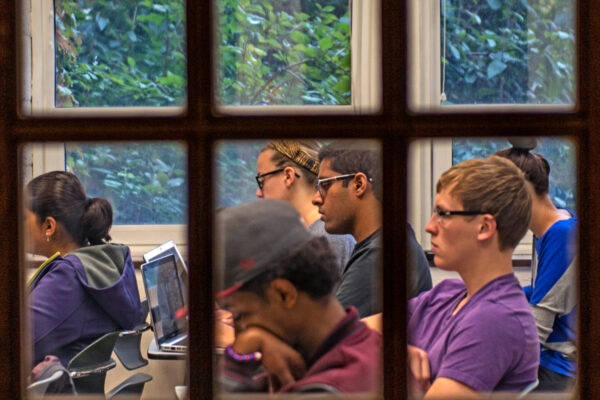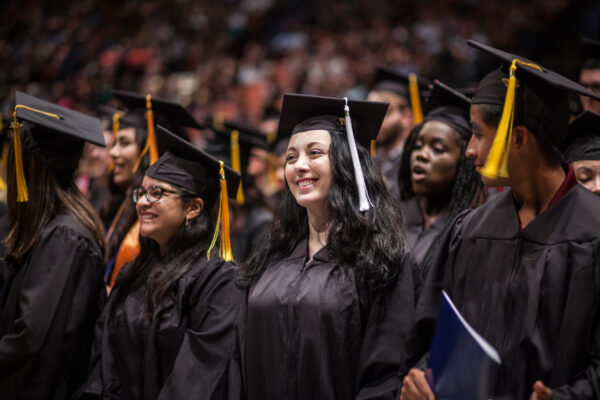ACE2018: Student Success, Attainment, and Equity—International Lessons
By Erin Baldwin
American colleges and universities operate today as part of a global higher education ecosystem, with students, faculty, and ideas more mobile than ever. As participation in tertiary education has widened throughout much of the world, the challenges institutional leaders face for improving teaching and learning, strengthening student support, and increasing the rate of degree completion also transcend borders.
ACE’s Center for Internationalization and Global Engagement is engaged with Lumina Foundation in a two-year initiative to form a global learning community dedicated to an in-depth exploration of this topic through research, global and regional meetings, and the exchange of ideas and promising practices.
During ACE2018, the session “Student Success, Attainment, and Equity: International Lessons” sponsored by Lumina Foundation, brought together university leaders from Canada, Colombia, Mexico, and the United States to compare innovative policies and programs shown to improve rates of success and degree attainment, particularly among traditionally underserved student populations.
The discussion, moderated by Fernando León García (president, CETYS Universidad), included panelists Marta Losada Falk (president, University Antonio Nariño in Colombia), Paul LeBlanc (president, Southern New Hampshire University), and Ralph Nilson (president and vice-chancellor, Vancouver Island University in Canada). Each panelist is a committed member of the ACE-Lumina initiative and participated in the inaugural meeting of the consortium in February 2018. Questions posed to the panel touched on several fundamental themes and key issues the group is working to address, including equity gaps and removing barriers to attainment.
Responses from the panelists incited a dynamic and frank conversation about the common political and systemic challenges faced by higher education around the world, the varied kinds of support underserved students need to successfully complete their degree, and proactive approaches being taken to ensure an inclusive, diverse learning environment for all students.
Ralph Nilson began by outlining several innovative practices Vancouver Island University (VIU) has enacted to reach and retain Canada’s historically marginalized indigenous students, including initiatives to deepen connections between campus and community and to enable students to see themselves represented in higher education. Nilson acknowledged that marginalization in Canadian higher education is not limited to First Nations populations. “VIU recognizes that education is the key determinant of social change. How can we provide the opportunity for all communities to access institutions of higher education, and recognize the institutions as theirs?”
Creating a sense of belonging was a point reinforced by the rest of the panel as well. Paul Leblanc highlighted Southern New Hampshire University’s work to reach other marginalized populations both in the United States and abroad, such as homeless youth, youth aging out of the foster care system, and students in refugee camps.
Similarly, Marta Losada spoke about Colombian government initiatives proven to accelerate the inclusion of regional populations’ access to higher education. Losada noted that while policy efforts emphasizing access for low-income populations have succeeded in opening the door for more students, pathways to completion remain rigid and segmented. This challenge has parallels in the U.S. where, as Leblanc stated, “restrictions on how financial aid money is allowed to be spent has a great deal of influence over who higher education can serve.”
Much of the conversation around higher education in the United States has shifted focus from access to completion. Even more recently, in tandem with completion, the question has become: Are students adequately prepared and skilled for the jobs of today and tomorrow? Panelists discussed the importance of close alignment between higher education and employers, and the need to expand beyond traditional degree pathways to include mobile, stackable credentials and competency-based approaches to training. In a globalized world, there is a need to examine and experiment with how credentials and training requirements are transferable across national boundaries.
Echoing ACE President Ted Mitchell’s statement from earlier in the conference, Ralph Nilson pointed to the responsibility universities have in keeping borders open regardless of shifting political contexts. “It is critically important,” he said, “to ensure that the movement of people and dispersement of talent remains.”
Tying the threads of the conversation together, Marta Losada posited, “How do we allow for stackable pathways that are high quality, while keeping social mobility open and fluid?” While the complexities inherent in these issues do not lend themselves to easy answers, this discussion served to highlight creative and effective approaches from around the world and the innumerable ways in which we can address questions and challenges together.
As Paul LeBlanc observed, “When it comes to solving higher education problems in the United States, we must be more willing to be critical of our own industry, and increasingly open to learning from one another.”
If you have any questions or comments about this blog post, please contact us.


